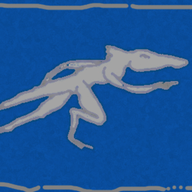House Wavir's history is a success story that has few equals. The house began a little over two centuries ago when a freelance adventurer, Traxidos Wavir (now fondly remembered simply as “The Wavir”) founded the company as a joint venture with several of his adventuring companions. Traxidos's own story is just as fascinating as that of his merchant house. A former slave gladiator who bought his own freedom, Traxidos fell in with a number of other adventurers. The band set out to explore the ruins near Balic. The going was rough at first – attacks by raiding tribes and thri-kreen hunters took the lives of several of Traxidos's companions. The ruins themselves proved to be home to a nest of gith, who engaged the companions in an epic running battle. Finally, the gith fled, leaving Traxidos and three other survivors to loot the ruins. Exactly what was found is untold, but it must have been substantial, for the four returned to Balic with mekillotloads of plunder. With these profits, the companions entered into partnership, selecting Traxidos as the new trading house's leader. Despite the substantial profits from their adventuring, Traxidos and his partners soon realized that even their own awesome wealth did not compare to that of the established houses. Tomblador, Rees, Malaxi, and the other houses were loathe to share their markets with upstart ex-slaves and adventurers. Prices of goods and services unaccountably rose, and the services of guards, agents, and mercenaries became suddenly scarce. Masked assassins slew Thassa Amita, the only psionicist in the group; a similar attempt upon Traxidos's life was foiled. The cost of outfitting House Wavir's first two caravans used up almost all of the partners' cash. By the time the embattled merchants had sent them out, their situation was indeed desperate. Again, luck was with Wavir, for their first caravan, loaded with water and grain, reached Urik just as that city was in the midst of a major drought and subsequent famine. Wavir was able to name its price, and a grateful sorcerer-king paid huge amounts out of his treasury to feed his restive subjects. The second caravan survived an attack by elven raiders and also returned a substantial profit. Soon, it became apparent that House Wavir would not simply disappear. Rival houses began to bow to the inevitable; they allowed Wavir to continue to do business, relatively unmolested. This period (often called “the blooding”) is typical of new and ambitious merchant houses. Few upstart houses ever survive it. Wavir proved an exception in more ways than one, for Traxidos proceeded to grow wealthy and powerful, laying the foundations of the legendary house that was to survive him. He died peacefully in bed nearly six decades later, safe in the assurance that his descendants would rule over one of the greatest Athasian merchant houses. Since then, House Wavir has not forgotten its humble origins. Remembering how intrigue and assassins almost destroyed them, Traxidos's descendants remain ever vigilant. Their guards and agents are trained in the arts of counter espionage and detection. In addition, House Wavir seems to value competition as a means of maintaining healthy markets (and also for the challenge it represents), and it rarely harasses or attacks smaller trading houses. In fact, many claim that they have received loans and other assistance from House Wavir, particularly if the smaller house's activities serve to frustrate Wavir's rivals. Today, House Wavir reigns supreme, dominating even its old enemies, Tomblador and Rees. Wavir's bitterest rival, Malaxi, is no more, swept away like desert sands by time and misfortune. Dozens of caravans fly Wavir's silver jozhal, and the house maintains permanent bases throughout the Tyr region. House Wavir provides lasting proof that with luck and bravery, even the lowest of the low can rise to become rich and powerful.
Under the leadership of its current patriarch, Tabaros,
House Wavir has risen far above its humble beginnings
to become one of the most powerful merchant houses
in the Tyr region. From its base in Balic, Wavir now
controls vast trade routes, dominating the shipment and
sale of grain, ceramics, and precious metals.
Wavir's business practices border on the ruthless,
but they are always conducted in accordance with the
Merchants' Code. All profits are reinvested in house
operations. House Wavir's enormous wealth and influence
have led many to speculate that Tabaros has a secret
source of income (speculations that are discussed in detail
later), but so far no proof of this has been found. House
Wavir's symbol is a silver jozhal on a blue field.
